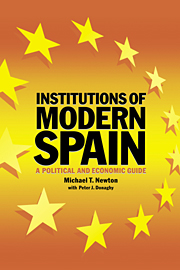Book contents
- Frontmatter
- Contents
- List of figures
- List of tables
- Preface to the second edition
- Preface to the first edition
- Acknowledgements
- Chronological résumé of Spanish history since 1939
- 1 Introduction
- 2 The Constitution of 1978
- 3 The monarchy
- 4 Parliament
- 5 Central government
- 6 Central administration
- 7 Regional government and administration
- 8 Local administration
- 9 Public sector enterprises
- 10 Political parties
- 11 Trade unions
- 12 Business and professional associations
- 13 Financial institutions
- 14 The judiciary
- 15 Spain and Europe
- 16 Conclusion
- Appendix: elections in Spain, 1977–96
- Select bibliography
- Index of institutions and office holders
8 - Local administration
Published online by Cambridge University Press: 03 May 2010
- Frontmatter
- Contents
- List of figures
- List of tables
- Preface to the second edition
- Preface to the first edition
- Acknowledgements
- Chronological résumé of Spanish history since 1939
- 1 Introduction
- 2 The Constitution of 1978
- 3 The monarchy
- 4 Parliament
- 5 Central government
- 6 Central administration
- 7 Regional government and administration
- 8 Local administration
- 9 Public sector enterprises
- 10 Political parties
- 11 Trade unions
- 12 Business and professional associations
- 13 Financial institutions
- 14 The judiciary
- 15 Spain and Europe
- 16 Conclusion
- Appendix: elections in Spain, 1977–96
- Select bibliography
- Index of institutions and office holders
Summary
Preliminary note
The institutions making up what is most accutately referred to, at least in Spain, as ‘local administration’ but is often called ‘local government’ in the UK context, include the municipal and provincial authorities. In legal documents, these institutions are known collectively as local corporations (corporaciones locales). Although, since the devolution of powers to the regions (chapter 7), these local institutions are subject to the legal framework of the autonomous communities, they remain financially, to a large extent, dependent on central government. On the other hand, in recent years the trend has been towards increasing co-operation between these bodies and the regional authorities in whose ambit they are located.
Introduction
The Franco regime, in combining political repression with excessive bureaucratic centralism, presided over the effective demise of local democracy. During the Franco era, local institutions were basically instruments for administering the policies of central government and enjoyed no real autonomy. Such was the degree of central control that mayors, for example, were directly appointed by Franco's minister for home affairs or the civil governor of the province concerned, both of whom were directly appointed by Franco. Moreover, local elections were rigidly controlled by the dictator's single party, the National Movement (1.12) which ensured that, to those few seats open to direct election, only officially sponsored candidates were elected.
- Type
- Chapter
- Information
- Institutions of Modern SpainA Political and Economic Guide, pp. 145 - 163Publisher: Cambridge University PressPrint publication year: 1997



